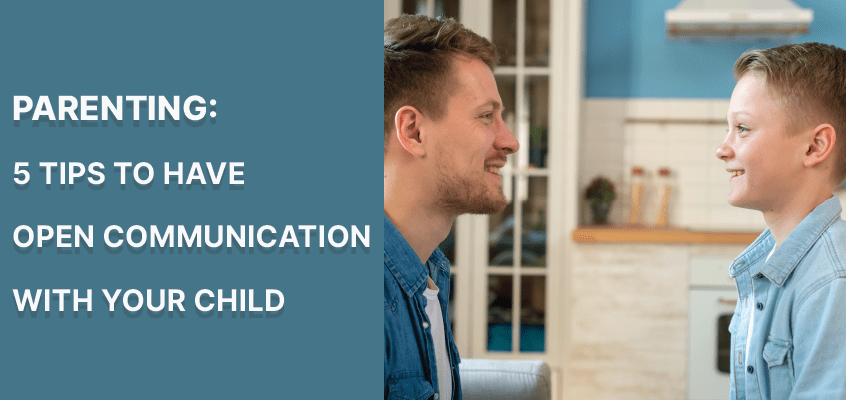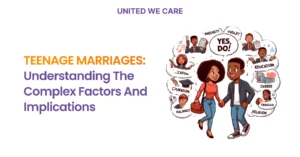Introduction
Communicating with children, especially teenagers, can become challenging for parents, and it is essential to build an environment where children and parents can express their feelings without hesitation. Good communication between parents and children is characterized by openness and clarity, and parents can learn how to communicate openly and build stronger bonds with children.
What Is The Importance Of Communication In Parenting?
The McMaster Model of Family Functioning, the most famous model of Family Therapy, has identified communication as an integral part of whether a family will be functional or dysfunctional [2]. According to the model, if the communication is ineffective, for instance, messages are unclear or a space to communicate one’s feelings directly is not present, the family will be dysfunctional.
Communication is also central to the development of children and their psycho-social adjustment [1]. There is significant evidence that when communication is good, children and adolescents are:
- Well adjusted psycho-socially
- Have fewer behavioral problems
- Are less likely to have mental health issues like depression and anxiety
- Are less likely to indulge in risk-taking behavior
- Less likely to engage in self-harm [3]
- Have better self-esteem, moral reasoning, and academic achievement
Thus, when parents master effective communication, their children are more likely to grow into happy and healthy individuals. Further, open and transparent communication is likely to improve the family’s overall well-being.
Must Read- Narcissistic Parent
What Are The Benefits Of Open Communication In Parenting?
An open communication environment is a space where parents show higher acceptance towards the thoughts and opinions of their child, offer evaluative feedback, actively listen, and support the child’s viewpoint [4]. Building an environment with open communication can benefit the parent-child relationship. These include:
- More Self-Disclosure: When the environment encourages open communication, children and adolescents are more likely to indulge in self-disclosure [5]. When parents submit in open communication, the child is more likely to reciprocate and talk openly.
- Lesser Conflicts or Misunderstandings: A family with open communication will prioritize listening to each other and practice this skill regularly. It is likely to reduce conflicts within the family. Research indicates a hidden link between good family communication and lesser conflict between family and children [6].
- Help Children Discover Themselves: especially for adolescents, discovering self and clarity on who they are is an important task. A space where communication is open and the child can share his/her/their opinions and views helps clarify children’s developing sense of self [4].
- Improve Relationships between child and parent: when communication is open, considerable time is spent understanding the other person. In parent-child relationships, it has been found that when communication is open and practical, the connections are strong and better [1] [7].
There is often a significant difference between parents and children in terms of how many times they have open and effective communication. Parents often believe that communication is open while children have other thoughts [1]. It is thus essential to keep checking oneself and learning more open communication skills.
Open Communication And Setting Up Of Boundaries
Another essential component in families is that of boundaries [8]. Edges can be on a continuum with rigid boundaries on one end, and no one in the family can break them (Ex, no one can talk to their father after he comes home). On the other end are diffused boundaries and who does what is unclear (Ex, children soothe parents and tell them what they need). In the middle are clear boundaries, which are also flexible [9]. Clear boundaries improve family functioning.
When parents communicate openly with each other and with children, they can set clear expectations of behaviors and clear boundaries. Once set, children can negotiate these boundaries as they grow up or as the situation demands. This flexibility allows for open and honest discussions regarding several things, exceptionally acceptable behavior.
Read more about-Authoritative Parenting Vs. Permissive Parenting
Important Tips To Have Open Communication With Your Kids In Parenting
Setting up a space for open and effective communication is relatively easy. Using the following five tips, parents can build a healthy and functional family environment [7].
- Listen: Often, listening to itself needs to be revised. One might be in a hurry, tired, or distracted while listening. When children wish to talk, listen with full attention, remove distractions, maintain eye contact, and avoid interrupting the child with your doubts, insights, or emotional reactions [7] [10].
- Show that you listened by acknowledging the feeling: Communicating that you have heard a child is a potent tool. It makes them feel understood. Once the child finishes, you can summarize it and restate it or even identify what they are feeling and give it a name (ex, you are feeling angry at what happened in school). For younger children, you could also give them what they desire in a fantasy (Ex, wouldn’t it be cool if your homework magically completed itself) [7] [10]
- Express your honest feelings but at the child’s level: It is equally essential that the parent also expresses their opinions and feelings. However, it is necessary to understand that to do this, the parent will need to communicate with words and gestures, which the child will understand. Parents can also physically get to the child’s level by sitting so they can have eye contact [7].
- Learn the art of asking questions: It is also essential to ask questions to understand more about what the child is saying or feeling. However, parents often enter interrogation mode by asking multiple ‘yes-no’ questions. Instead, open-ended questions that allow the child to explain in detail and volunteer information are more appropriate [7].
- Avoid negative comments, criticism, and blame: It is easy to snap at the kids and threaten them during conflicts, especially battles. People often forget to show respect and instead bring forth criticism and guilt. Instead, children can be allowed to solve these issues themselves. Parents can describe the problem, ask for solutions, and inform children about their behavior [7].
Communication is a skill that takes time to develop. Some books, like Faber and Mazlish’s ‘How to Talk So That Kids Listen and Listen So That Kids Talk’ [10], can help parents improve their communication skills and form better relationships. One can also reach out to our experts at United We Care to hone these skills and learn how to communicate openly with children.
Must read- Child counselling for kids and teens
Conclusion
Parenting can be difficult, and communication with children is challenging. However, investing time in building open communication can help the children build stronger relationships. One can have available contact with children by listening to them, acknowledging their feelings, asking the right questions, and avoiding negative comments.
References
- Z. Xiao, X. Li, and B. Stanton, “Perceptions of parent-adolescent communication within families: It is a matter of perspective,” Psychology, Health & Medicine, vol. 16, no. 1, pp. 53–65, 2011.
- N. B. Epstein, D. S. Bishop, and S. Levin, “The McMaster model of family functioning,” Journal of Marital and Family Therapy, vol. 4, no. 4, pp. 19–31, 1978.
- A. L. Tulloch, L. Blizzard, and Z. Pinkus, “Adolescent-parent communication in self-harm,” Journal of Adolescent Health, vol. 21, no. 4, pp. 267–275, 1997.
- M. P. Van Dijk, S. Branje, L. Keijsers, S. T. Hawk, W. W. Hale, and W. Meeus, “Self-concept clarity across adolescence: Longitudinal associations with open communication with parents and internalizing symptoms,” Journal of Youth and Adolescence, vol. 43, no. 11, pp. 1861–1876, 2013.
- J. Kearney and K. Bussey, “The longitudinal influence of self-efficacy, communication, and parenting on spontaneous adolescent disclosure,” Journal of Research on Adolescence, vol. 25, no. 3, pp. 506–523, 2014.
- S. Jackson, J. Bijstra, L. Oostra, and H. Bosma, “Adolescents’ perceptions of communication with parents relative to specific aspects of relationships with parents and personal development,” Journal of Adolescence, vol. 21, no. 3, pp. 305–322, 1998.
- “Parent/child communication – center for effective parenting.” [Online]. Available here: [Accessed: 28-Apr-2023].
- C. Connelle, “Connelle Multicultural Perspectives – Rivier University.” [Online]. Available: [Accessed: 28-Apr-2023].
- R. GREEN and P. WERNER, “Intrusiveness and closeness-caregiving: Rethinking the concept of Family ‘enmeshment,’” Family Process, vol. 35, no. 2, pp. 115–136, 1996.
- A. Faber and E. Mazlish, How to talk so kids will listen & listen so kids will talk. New York: Perennial Currents, 2004.





